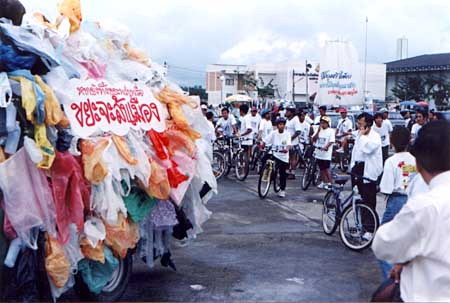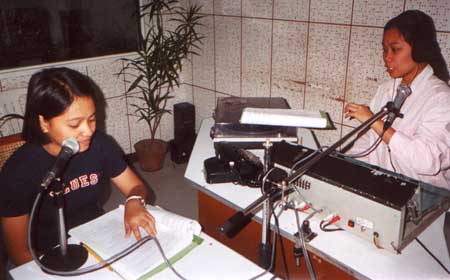PUPLIC
PARTICIPATION
Page 1
SUSTAINABLE DEVELOPMENT AND PARTICIPATORY PROCESSES
Page 2
WHAT
IS PUBLIC PARTICIPATION?
Page 6
DIFFERENT
WAYS
TO INVOLVE THE PUBLIC
Page 7
ROUND TABLES IN CANADA
Page 9
USING
ROUND TABLES IN THE TRANSPORTATION SECTOR IN POLAND
Page 10
URBAN
GREENING. PUBLIC PARTICIPATION IN
BANGKOK
Page 13
ENLISTING THE PUBLIC TO CLEAN UP CITIES
Page 15
EMPOWERMENT
AND PUPLIC PARTICIPATION
Page17
ICSC'S
ROLE AS A BROKER
Page 20
ICSC'S
CANADIAN TEAM-
PUPLIC PARTICIPATION AND MULTI-PARTY PROCESSES
Page 21


DOWNLOAD
TEXT ONLY
|

ENLISTING THE PUBLIC TO CLEAN UP CITIES
David Dungate
In the rush to accelerate the pace of development,
cities in economically developing countries often neglect the
importance of proper waste management. This neglect results in
environmental degradation, squandering resources and increased
disease within urban centres. In cities, local governments are
responsible for waste management; however, local government officials
are often constrained by low budgets and lack of trained staff.
Furthermore, city officials are often poor at communicating with
citizens their goals and priorities for waste management and soliciting
public support to achieve those goals. Increasing public participation
in waste management can be an effective way to improve both the
planning and implementation of new waste management initiatives.
The Canadian International Development Agency (CIDA)
is providing funding for ICSC's Southeast Asian Local Solid Waste
Improvement Project (SEALSWIP). The project has convened stakeholder
groups in six cities: Hat Yai and Udon Thani in Thailand, Rantepao
and Makale in Indonesia and Bacolod and Iloilo in the Philippines.
Modelled after Round Tables, the stakeholder committees bring
together government, business and civil society representatives
to plan and recommend new waste management initiatives.

In all the SEALSWIP municipalities, the concept
of a stakeholder group is a new concept compared to traditional
hierarchical governance structures. By keeping the stakeholder
groups focused on practical and achievable results, success in
tackling the waste problems is being achieved. The stakeholder
committees are also making the decision-making process more open
and transparent and therefore more resistant to individuals in
positions of power trying to subvert municipal environmental initiatives
for personal gain. ICSC is working to clean up cities in more
than one way.
| According to Dr.
Thavee, Director of Sanitation for the Municipality of Phuket
(a pilot city for the SEALSWIP project). "The most important
function of the stakeholder group has been to raise the awareness
of the private sector to be active participants in solving
the problems of waste management in the community". |
One central component of the SEALSWIP program has
been increasing the public's involvement in solid waste management
issues. In Phuket, the pilot city, the stakeholder committee launched
a massive public awareness campaign, declaring a "War on
Garbage", complete with T shirts, parades and school visits.

In Bacolod the school program initiated and supported
by Autralian Aid has moved from talk to action with the addition
of recyling cans donated by ICSC and arrangements for the new
Junkers Cooperative to visit the schools regularly to buy the
recyclables. The schools get money and the waste is sorted and
handled appropriately. The success of school recycling programs
and the impacts that these have had on the attitudes of parents
has been reported in all the cities involved, and reflects similar
experiences in cities in Canada and Poland. Parents complain or
brag, "I'm learning to recycle from my kids".
The activities of the project in Bacolod have been
the subject of TV and radio for the past few months. The co-chair
of the stakeholder committee hosts an early morning radio program
and invited the local project manager to fill in as host for a
few weeks. Every day listeners woke up to the latest news about
garbage and heard the stories of waste pickers and junkers, or
heard about landfill issues.

Page 14 Page 15 Page16
GO TO
PAGE1, 2,
3, 4,
5, 6,
7, 8,
9, 10,
11, 12,
13, 14,
15, 16,
17,
18,
19,
20,
21,
Copyright ICSC 2000
|